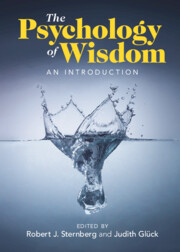Book contents
- The Psychology of Wisdom
- The Psychology of Wisdom
- Copyright page
- Contents
- Figures
- Tables
- Contributors
- Preface
- Part I Introduction to Wisdom Theory and Research
- Part II Foundations of Wisdom in the Individual and in the World
- Part III The Modifiability of Wisdom
- Part IV Wisdom in the World
- Chapter 13 Wisdom in the Professions
- Chapter 14 Wisdom and Leadership
- Chapter 15 Wisdom and Social Policy
- Index
- References
Chapter 13 - Wisdom in the Professions
from Part IV - Wisdom in the World
Published online by Cambridge University Press: 26 May 2022
- The Psychology of Wisdom
- The Psychology of Wisdom
- Copyright page
- Contents
- Figures
- Tables
- Contributors
- Preface
- Part I Introduction to Wisdom Theory and Research
- Part II Foundations of Wisdom in the Individual and in the World
- Part III The Modifiability of Wisdom
- Part IV Wisdom in the World
- Chapter 13 Wisdom in the Professions
- Chapter 14 Wisdom and Leadership
- Chapter 15 Wisdom and Social Policy
- Index
- References
Summary
Aristotle, in Nicomachean Ethics, wrote of the importance of what he called practical wisdom (phronesis) as a key guide to human action. Practical wisdom is the will to do the right thing in a given situation, and the skill to figure out what the right thing is. This chapter discusses what practical wisdom is, and illustrates why it is needed for successful practice in almost all professions. Will is essential because it keeps professionals on track to pursue the proper aims of a profession (eg., healing the sick and easing suffering, in medicine), and skill is important because every situation is different and professionals need empathy, improvisation, good listening, imagination, and perspective taking to find the actions that each situation requires.
- Type
- Chapter
- Information
- The Psychology of WisdomAn Introduction, pp. 211 - 229Publisher: Cambridge University PressPrint publication year: 2022



